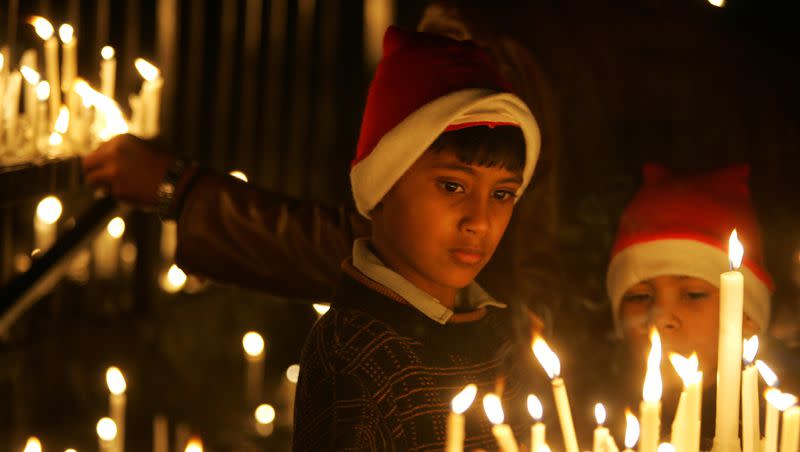What changes about church when Christmas Eve is on a Sunday?

This article was first published in the State of Faith newsletter. Sign up to receive the newsletter in your inbox each Monday night.
Thinking about Christmas Eve makes me feel warm and fuzzy inside.
It’s always been a special day to me, for family reasons and religious ones.
By the time Christmas Eve rolls around, my family has our holiday errands wrapped up. We typically sleep in and then lay around in our pajamas watching TV, perhaps rousing ourselves enough at some point to bake the pies for the Christmas feast.
Late in the afternoon, it’s time to get ready for the Christmas Eve worship service, which, at least in the Presbyterian Church, features lots of familiar hymns and beautiful candlelight. At church, we hear the story of Christ’s birth and give thanks.
Afterward, my family eats a late dinner, opens one present and then watches Christmas movies until it’s time for bed. All in all, it’s a quiet, peaceful, lovely day.
But this year, Christmas Eve is a little more complicated for my family and others. That’s because it falls on a Sunday and, in churches that observe Advent, is part of the series of four Sundays that helps worshippers prepare their hearts and minds for Christmas.
In other words, in many churches, Christmas Eve 2023 will include two separate services that are both religiously significant: one in the morning focused on the Advent theme of love and one in the evening with the typical Christmas Eve songs and stories.
I’m not complaining about the schedule. I’m just noting that it’s unfamiliar. So unfamiliar that some religious leaders are worried that people will think of at least one of the two services as optional and skip it to sleep in or spend more time relaxing with loved ones.
“Do I have to go to Mass twice this weekend? ... Over the past couple of weeks, I have been asked this question several times. Simply put, the answer is yes, although I would always prefer for us to understand that we get to go to Mass twice in one weekend rather than we have to go,” wrote one Catholic priest to his congregation.
The priest urged readers to remember that Christ is the reason for the season and to make room for worship in their Christmas weekend plans.
While I support that message, I can’t help but feel a little “holy envy” for my friends and co-workers who are members of The Church of Jesus Christ of Latter-day Saints.
When I recently told some of them about how busy Christmas Eve will be in most Protestant and Catholic churches, they noted that their church is actually shortening the typical Sunday service on Christmas Eve in order to give worshippers more time with their families, including time that will be spent reflecting on the religious themes of the day.
I love that idea, because Christmas Eve, for me, as I noted above, is about family and faith. I want to spend it in church, yes, but also sitting in the living room or around the dining room table talking with my loved ones about cookies, Clark Griswold, Christ’s birth and everything else under the sun.
If you and your family observe Christmas Eve, I hope you find ways to balance its sacred and secular aspects. I hope it’s a wonderful, heartwarming day.
Fresh off the press
Pope clears the way for blessings of same-sex couples
Why can’t New York keep guns out of churches?
Supreme Court will hear abortion pill case
Term of the week: Kalaupapa
Kalaupapa is a Hawaiian peninsula that played a key role in the government’s effort to contain a leprosy outbreak in the 1800s. People with leprosy were forced to abandon their loved ones and go to the area, where they’d be cared for away from people who were vulnerable to the disease, according to The Associated Press.
The AP’s recent article on Kalaupapa highlights the work of Catholic missionaries who tried to make the lives of leprosy patients as comfortable as possible. “The patients were immersed in suffering from the disease and the separation,” the article said.
The government’s containment policy was finally lifted in 1969, soon after a cure for what’s now called Hansen’s disease was developed. But today, eight former patients still call Kalaupapa home.
What I’m reading...
What are people looking for when they open the YouVersion Bible app? Messages of God’s faithfulness and reasons to have hope, according to the app’s founder, Bobby Gruenewald, who recently spoke to Religion News Service about Bible-related trends.
The Revs. Vincent Johnson and Jacques Boyd have now helped one another through the same tragedy, four years apart: Loss of church buildings due to tornado damage. The Rev. Johnson’s congregation was hit earlier this month when major storms moved through Nashville, according to The Associated Press.
Over the weekend, the Deseret News unveiled its list of top photos from 2023. It includes so many breathtaking images!
Odds and ends
Ahead of Halloween in 2018, I wrote about the little-discussed monster stories in the Bible and how spooky its descriptions of sea monsters, giants and spirits can be. Now, one of the scholars I interviewed for that article, Esther J. Hamori, has a book out about “God’s monsters.”

